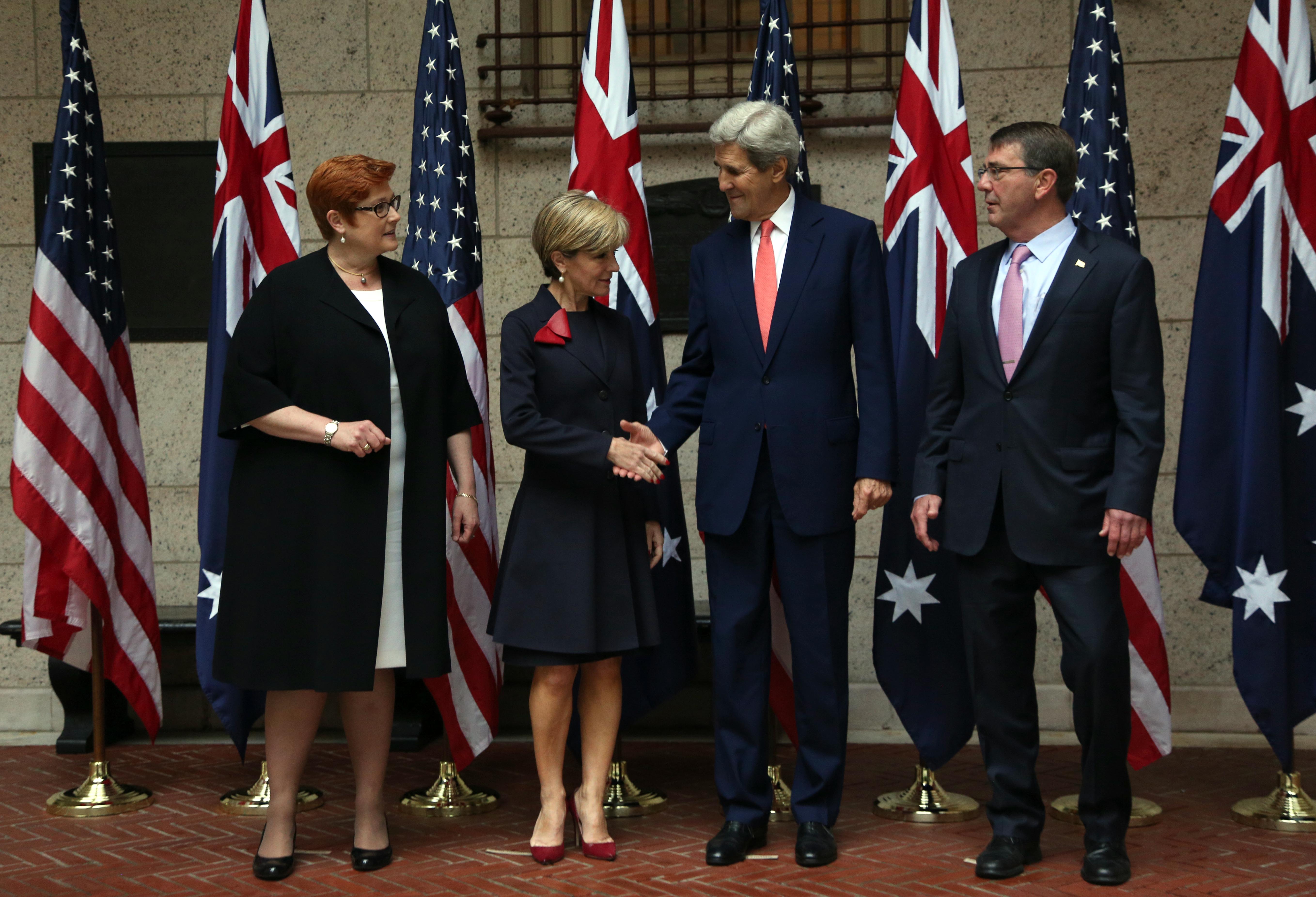
During the Cold War, we were good allies to the Americans. Our presence in Korea and Vietnam was testament to our bona fides. But prime ministers Whitlam, Fraser, Keating and Hawke all had security policy differences with Washington and, during or after leaving office, expressed views which questioned aspects of the alliance.
Over the past two decades, it has become axiomatic for Australian governments to support, without serious qualification, the main thrusts of American security policy whether in the Asia–Pacific, the Middle East or Eastern Europe. This approach has thus far been broadly right regarding Asia, mainly wrong in the Middle East, and while shrilly bombastic on Eastern Europe, not gravely prejudicial to our interests.
More recently, while the politicians and security communities in the US and Australia continue to genuflect to ANZUS, the attitudes of the public in both countries may be less ebullient (in the American case not specifically about its alliance with Australia, but on its military undertakings generally)
If for no other reason, we need to think about the centrality of ANZUS to our foreign policy.
While the United States still sees itself as the world’s sole superpower, it increasingly questions its global role. Three overlapping American perspectives on security policy come to mind.
First, informed American opinion is unanimous that the United States’ appetite for military engagement has declined. This view is also supported by recent polling by the Pew Research Centre which points to an increase since 2010 from 46% to 57% of those believing that the US should deal with its own problems, leaving others to do the same.
A second perspective is reflected in some of President Obama’s arguments in the now famous piece in The Atlantic. These suggest he has become fatalistic about the limits on America’s power. He’s suspicious of the so-called ‘Washington playbook’ which he sees as relying excessively on militarised responses to crises. He believes that before exercising military power, the US has to be clear about its core interests and about why it’s making a military commitment.
Some argue Obama’s policies in the Middle East have in practice differed little from those of Bush, and that he’s now seeking to project the legacy he would have preferred. Others see him as a vacillator who sold out America and argue that when he goes America will revert to a more traditional view of security policy.
Neither approach however contradicts the contention that in expressing himself as he did, Obama understood that while Americans will accept military commitments based on protection of core American interests, they will be unreceptive when such commitments are based on less than concrete concepts of international order.
The third perspective is demonstrated by populist sentiments which have become increasingly evident over the past six months and which Messrs Sanders and Trump have harnessed. Both candidates have played upon fears of foreign military entanglements and international economic commitments. Trump has also stoked xenophobia.
The concern here isn’t about the degree to which Clinton has been thrown off course by Sanders or the risk of a Trump ascendancy, it’s that the currents that have swept them along are so strong that no American political aspirant can ignore them.
America is not about to enter a new isolationist phase. Neither Obama, nor Trump, nor anyone else is suggesting that it do so. But America is thinking differently. Its preparedness to act as a protector of Australia or anyone else is increasingly likely to be premised only on hard assessments of American need and risk.
There are also indications that the difference in the perspectives of the American security establishment and the American people may have a few analogies in Australia.
Australians strongly support ANZUS as evidenced by a number of Lowy polls. Both political parties know this and act accordingly. However Lowy polling three years ago also showed that dispatch of troops to support the United States in the Middle East drew only 48% support and hypothetically in Asia, even less at 37%.
A survey released earlier this month (PDF) by the United States Studies Centre and the Perth USAsia Centre suggested that Australians see United States’ regional power as on the wane. Only 22% of Australians polled believed that the United States is the most influential country in Asia, a much lower proportion than Japanese, Koreans or Indonesians. More Australians compared with any other country’s respondents selected China as the most influential country in Asia. There was also a surprisingly high Australian emphasis on the desire for improved relations with China rather than with the United States.
Another Lowy survey released earlier this week noted that respondents accorded equal importance to our relationships with China and the United States (43%). This differed from two years ago when 48% accorded most importance to the US compared with 37% for China. Moreover, perhaps partly influenced by the Trump factor, support for ANZUS was down nine points to its lowest level since 2007.
It’s drawing a long bow to suggest that these surveys show a structural decline in our support for ANZUS, and an even longer one to suggest that the Australian psyche would readily adjust to the absence of American guarantees.
Australians would probably stand up to be counted in the case of a clear and direct threat to the United States. But we might question the automaticity of “being in it” in situations in Asia or elsewhere in which we saw the dangers differently to the Americans.
Our next government needs to look again at the issues by way of a fresh White Paper authored by a multidisciplinary team capable of seeing Australia’s national interests more broadly.
ANZUS can only be thought through in the context of our foreign policy environment as a whole. It cannot be divorced from our other regional and global interests. In 1973, Gough Whitlam famously said: ‘For all its enduring importance, adherence to ANZUS does not constitute a foreign policy’.
Today this comment rings truer than ever.

